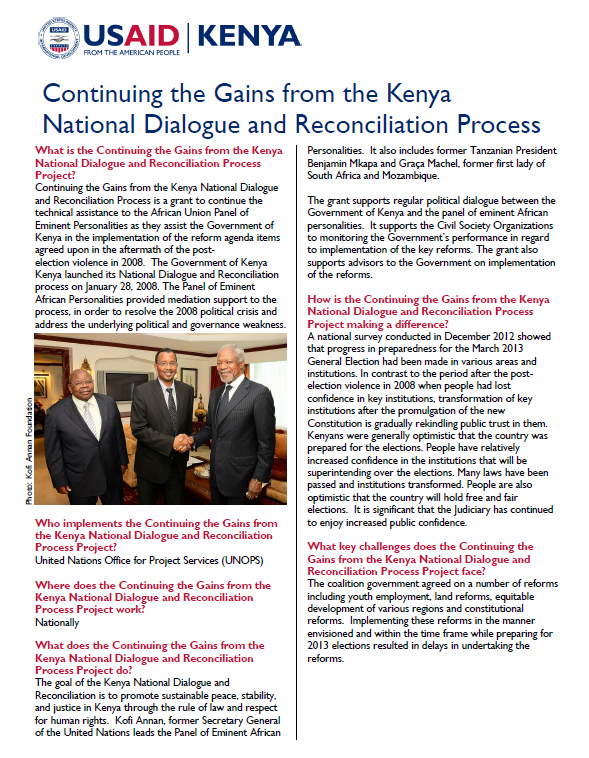|
Continuing the Gains FACT SHEET_March 2013 |
What is the Continuing the Gains from the Kenya National Dialogue and Reconciliation Process Project?
Continuing the Gains from the Kenya National Dialogue and Reconciliation Process is a grant to continue the technical assistance to the African Union Panel of Eminent Personalities as they assist the Government of Kenya in the implementation of the reform agenda items agreed upon in the aftermath of the post-election violence in 2008. The Government of Kenya Kenya launched its National Dialogue and Reconciliation process on January 28, 2008. The Panel of Eminent African Personalities provided mediation support to the process, in order to resolve the 2008 political crisis and address the underlying political and governance weakness.
Project Duration and Budget
January 2012 – September 2013
$350,000
Who implements the Kenya National Dialogue and Reconciliation Process Project?
United Nations Office for Project Services (UNOPS)
Where does the grant work?
Nationally
What does the Continuing the Gains from the Kenya National Dialogue and Reconciliation Process Project do?
The goal of the Kenya National Dialogue and Reconciliation is to promote sustainable peace, stability, and justice in Kenya through the rule of law and respect for human rights. Kofi Annan, former Secretary General of the United Nations leads the Panel of Eminent African Personalities. It also includes former Tanzanian President Benjamin Mkapa and Graça Machel, former first lady of South Africa and Mozambique.
The grant supports regular political dialogue between the Government of Kenya and the panel of eminent African personalities. It supports the Civil Society Organizations to monitoring the Government’s performance in regard to implementation of the key reforms. The grant also supports advisors to the Government on implementation of the reforms.
How is the Continuing the Gains from the Kenya National Dialogue and Reconciliation Process Project making a difference?
A national survey conducted in December 2012 showed that progress in preparedness for the March 2013 General Election had been made in various areas and institutions. In contrast to the period after the post-election violence in 2008 when people had lost confidence in key institutions, transformation of key institutions after the promulgation of the new Constitution is gradually rekindling public trust in them. Kenyans were generally optimistic that the country was prepared for the elections. People have relatively increased confidence in the institutions that will be superintending over the elections. Many laws have been passed and institutions transformed. People are also optimistic that the country will hold free and fair elections. It is significant that the Judiciary has continued to enjoy increased public confidence.
What key challenges does the Continuing the Gains from the Kenya National Dialogue and Reconciliation Process Project face?
The coalition government agreed on a number of reforms including youth employment, land reforms, equitable development of various regions and constitutional reforms. Implementing these reforms in the manner envisioned and within the time frame while preparing for 2013 elections resulted in delays in undertaking the reforms.
For more information:
John Smith-Sreen, Director
Office of Democracy, Rights and Governance
USAID/Kenya
Tel: +254 (0)20 862 2000
E-mail: Jsmith-sreen@usaid.gov
Sheila Karani, Project Manager
USAID/Kenya
Democracy, Human Rights and Governance
Tel: +254 20 862 2000
Email: skarani@usaid.gov
Patrick Fruchet, Operations Center, Director
UNOPS
AU Building, Museum Hill
Next to CFC Bank
Tel: +254 20 762 1613
Email: PatrickF@unops.org
Updated March 2013








Comment
Make a general inquiry or suggest an improvement.